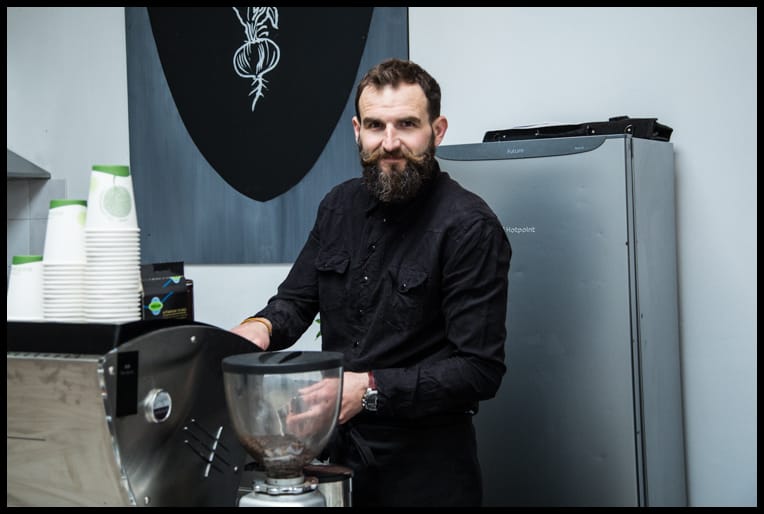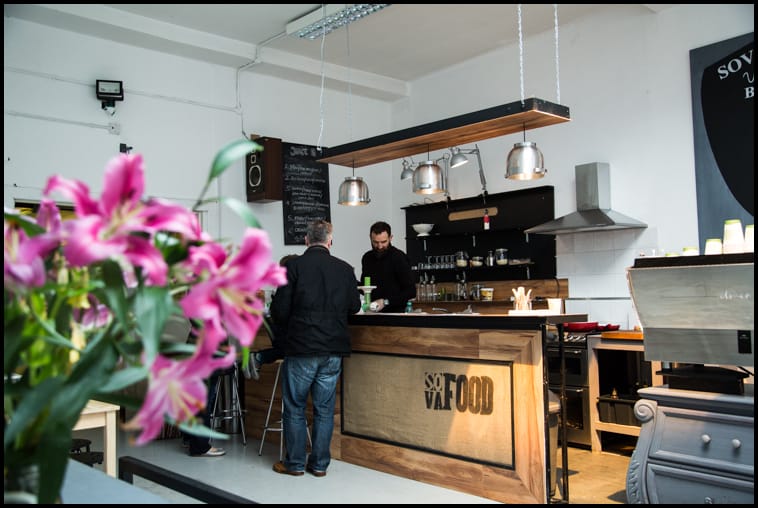What’s the best way to tell area residents about plans for a new asylum shelter nearby?
The government should tell communities directly about plans for new asylum shelters, some activists and politicians say.
Is Dublin ready for them? At the end of the three months the question will be answered: can a fully-fledged vegan eatery survive here?

Last month saw the opening of Sova Food Vegan Butchers in Rathmines, the city’s only strictly vegan restaurant. What started and proved a great success as a weekly pop-up in the Paris Wine Bar on Frenchman’s Lane at the end of last year is now a Wednesday-to-Sunday operation with a three-month lease.
At the end of the three months the question will be answered: can a fully-fledged vegan eatery survive in Dublin?
Owner Bart Sowa is optimistic, but not delusional. The tall, bearded, strapping Polish native has worked in the food industry all his adult life and is well aware that 75 percent of new food businesses fail within the first year.
“It’s a challenge for me. But I believe it will work,” he says. “It has to.”
Its location on Rathmines Road Lower, while not central, is a favourable one. At the end of a terrace of Georgian buildings next to the great green dome of Mary Immaculate of Sinners church, Sova is on one of the main arteries heading in and out of the city. Camden Street, Dublin’s mecca for hipsters, is only a stroll away. Sova shares its premises with MART, an arts organisation that provides studios and galleries for artists.

The restaurant, which is spacious and brilliantly lit thanks to an enormous sky-light, is sandwiched between a corridor with small studios on either side and a much larger studio and gallery space where artists can be seen through a set of glass panel doors working on their various projects.
This cool, bohemian environment seems like the perfect setting for a trendy vegan restaurant to thrive. Bart agrees. It also helps that many of the artists are vegan themselves. But he knows that it will take more than a few starving artists to make Sova a success.
The signs are encouraging though. There are no numbers on veganism in Ireland, but if those in the UK are anything to go by, the market is there and it’s growing. According to the Vegan Society, there are 150,000 vegans in Britain. The UK meat-free market for products such as tofu, imitation chicken fillets and burgers is now at £625 million, a 21 percent jump from 2009, according to market research group Mintel.
In the same period, the free-from market which includes dairy-free, wheat-free, and gluten-free products increased by 72 percent. Mintel claims that 12 percent of adults in the UK now follow a vegetarian or vegan diet, among 16 to 24 year olds, this rises to 20 percent.
And just last year, London saw the opening of its first vegan supermarket, Veganz. The German chain, started in 2011, will have 21 stores across Europe at the end of 2015. It plans to open its first in the US next year and aims to reach the 60 stores mark by 2020.
Many in the vegan community in Dublin are seeing similar signs of growth.
We’re still someway behind other capitals, says Edmund Long of Vegan Ireland, but “people are becoming more familiar with it. The trend is definitely changing.”
“There’s absolutely a market” for a vegan restaurant, says Deirdre McCafferty, owner of vegetarian restaurant Cornucopia. It’s one of the sector’s “biggest growth areas.”
Cornucopia, which celebrates its 30th anniversary next year, has seen a huge increase in demand for vegan food in the last five years. So much so that its menu is now 90 percent vegan, and Deirdre and her team hope to shift to an “increasingly creative, fully plant-based menu within the next few years.”
While many of Dublin’s restaurants have started to cater to vegan appetites, Gavyn Pedly of Moodley Manor, a vegan food company he founded with his Fiance Aisling Mooney, feels the capital lags other cities like Galway, Cork and Limerick in terms of its vegan-friendliness.
Apart from a handful of vegetarian and ethnic restaurants whose menus provide a multitude of vegan dishes, he still believes the vegan culinary scene in the capital is a restricted one. “A lot of times you’re stuck with one option,” he says. “You get used to eating spicy bean burgers and chips.”
Moodley Manor which will be supplying retailers in the coming months has seen a great demand for its products such as Boss Burger and Badass Bacon. Surprisingly, orders on the north side of the Liffey far outnumber those on the south. “Between 60 to 70 percent are on the north side,” Gavyn says. For six months he’s been wracking his brain as to why this is and still hasn’t come up with an answer.
Aside from being, seemingly, on the wrong side of the city, all of this will be music to Bart Sowa’s ears. Plenty of demand and lack of supply.
With a limited kitchen his focus is very much on quality not quantity. The lunch menu includes pan-fried sage potato pancakes served with wild mushroom ragu, smoked tofu lardons and tomato chips, and lentil meatballs in creamy fennel and dill sauce served with garlic crostini and pomegranate salad.
The dinner menu, which is served Friday and Saturday evenings, includes a starter of walnut-crust tempeh skewers, roast garlic steak with spinach and leek sauce, basil and mint-mashed potato, french-style ratatouille, and a selection of deserts including carrot cake and choc brownies.

The chia burger, which is on both lunch and dinner menus, is the most popular dish and Bart’s favourite. The burger itself is a mix of sun-dried tomato, garlic, smoked tofu, coriander and parsley and comes with jalapeño mayo, red onion marmalade, roasted courgette, fermented cucumber in a poppy-seed bun.
It is served, as are all the dishes, on an edible plate of compacted wheat and is decorated with a sprinkling of yellow-and-purple flower petals. The combination is mouth-wateringly moreish, and it’s easy to see why the chia burger is such a hit with both vegans and meat-lovers alike.
Sova’s produce is organic and locally sourced. The bread which is delivered fresh each day is from the same bakery that supplies Dylan McGrath’s restaurants. There is also a juice bar, and the coffee – which is excellent – is roasted locally. Sova has no drinks licence but does operate a BYOB policy and doesn’t charge corkage.
So far the venture has been going well. The restaurant has been attracting a steady stream of customers and the reviews on Facebook and Happycow.com, a vegan/vegetarian/healthy eating guide, have been overwhelmingly positive.
One reviewer, however, while praising of the food and the service, took issue with the “speciest language on the menu” as well as the word “butchers” in the name, finding it off-putting to be reminded of the “horrific and disgusting ways we use animals.”
But in naming dishes like the roasted garlic amaranth steak sambo and lentils meatballs in creamy fennel and dill sauce, Bart is hoping to tap into the burgeoning market of the part-time vegan, known as the flexitarian.
While many omnivores might feel going full vegan—cutting out meat, fish, poultry, eggs, and dairy—permanently, is one drastic step too far, there’s an increasing number who are happy to dabble. Unlike purist vegans, flexitarians aren’t necessarily opposed to eating animal products in principle, but see the vegan diet as a way to lose weight, detox, and become healthier.
There’s a general consensus in the nutrition community, including that of the American Dietetic Association, that a well-planned vegan diet can lower cholesterol, decrease the risk of heart disease and may also decrease the risk of cancers.
According to the UK Vegan Society, more people are pledging to go vegan for its seven or 30 days trials. Statistics for last year haven’t been released yet, but it saw a 75 percent increase in those signing from 2012 to 2013. Veganuary, a campaign that encourages people to go Vegan for the month of January, saw an increase of 400 percent in the numbers signing up this year compared to last. If this trend continues, it expects 50,000 pledges in 2016.
Not all flexitarians are willing to go weeks or even days on a strictly vegan diet. With initiatives like Paul McCartney’s Meat-Free Mondays, some are choosing to take it one day at a time. There’s also the VB6 diet, which advocates eating vegan up to 6pm. It became hugely popular in New York after New York Times food writer Mark Bittman published a book on the diet in 2013.
All are welcome as far as Bart is concerned. “Whatever makes you happy,” he says.